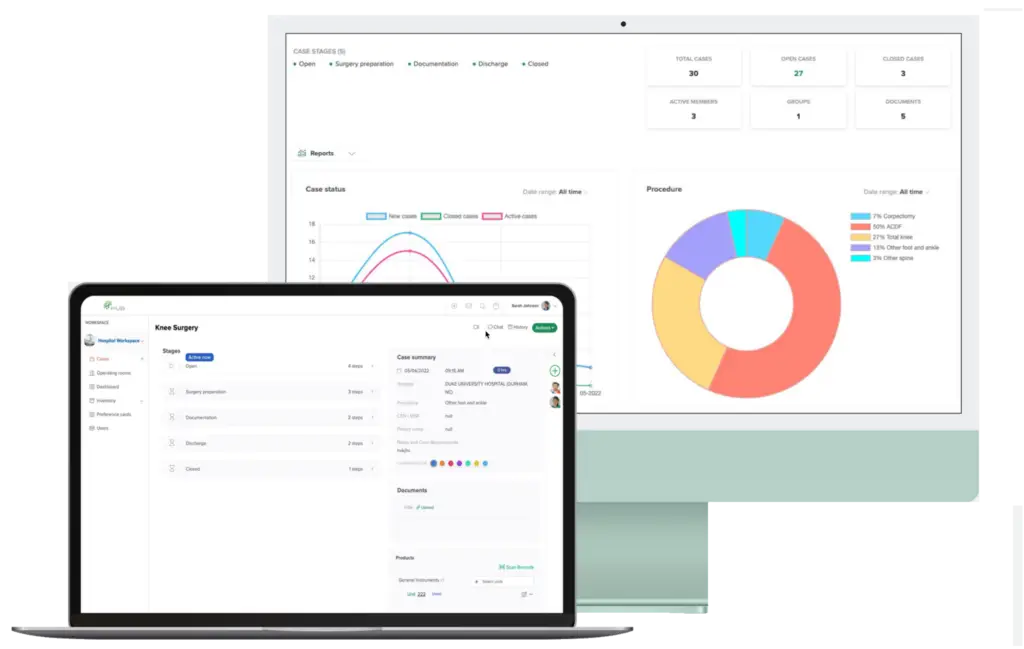The recent expansion of Ambulatory Surgery Center (ASC)-covered procedures has created a landscape filled with opportunities and challenges. While the growing patient volume offers ASCs the chance to serve more patients and generate more revenue, it also comes with complexities in billing, audits, and compliance. In order to navigate these changes effectively, ASC administrators and revenue cycle executives need to optimize their Revenue Cycle Management (RCM) processes.
This post offers three actionable strategies to help you streamline your ASC’s RCM, reduce bottlenecks, and ensure compliance in today’s evolving healthcare environment.

1. Leverage Technology to Enhance Your RCM Infrastructure
The increasing volume of patients means ASCs must adopt more sophisticated technology to manage billing and payments efficiently. Implementing advanced healthcare technologies can significantly reduce manual processes, enhance data accuracy, and ensure a smoother revenue cycle. Here are three key technologies that can be integrated into your ASC’s RCM:
Automated Coding and Billing Software: Automated solutions reduce the likelihood of human error and ensure that claims are coded accurately from the start. By automating the claims submission process, ASCs can speed up reimbursement times and minimize the risk of costly rejections.
Revenue Cycle Management Platforms: RCM platforms designed specifically for ASCs allow for seamless integration of scheduling, billing, and documentation. These systems also offer real-time insights into financial performance, helping administrators track key performance indicators (KPIs) like days in accounts receivable (A/R) and denial rates.
Electronic Health Records (EHR) Integration: Ensuring your RCM is tightly integrated with your EHR system can help streamline workflows by reducing redundant data entry and automating the flow of information between clinical and financial systems. This helps in reducing errors, improving patient billing accuracy, and accelerating claims submission.
Why This Matters
The right technology significantly reduces administrative workload, ensuring your ASC can handle the increased patient volume without sacrificing revenue or compliance. Furthermore, integrating automation and analytics into the RCM process provides ASC administrators with real-time data for proactive decision-making, leading to better financial outcomes.
2. Proactively Address Increased Scrutiny and Compliance Requirements
With more procedures being covered under the ASC model, regulatory scrutiny is higher than ever. Compliance with both state and federal guidelines is critical to avoiding audits, penalties, and potential disruptions to cash flow. Here’s how ASCs can stay ahead of these challenges:
Stay Current with Payer Policies: Regularly review updates from Medicare, Medicaid, and commercial payers to ensure that you’re compliant with their ever-changing reimbursement policies. Failing to adhere to the latest coding guidelines or pre-authorization requirements can lead to increased claim denials and payment delays.
Implement Audit-Preparedness Protocols: With audits becoming more common, ASCs must implement proactive compliance measures. Having a system in place to track clinical documentation, monitor coding accuracy, and store digital copies of necessary paperwork ensures that your facility is audit-ready. Training staff to be diligent about compliance is also essential for maintaining adherence to regulations.
Enhance Data Security: The Health Insurance Portability and Accountability Act (HIPAA) requires that patient data be secure. Implementing encryption and multi-factor authentication can safeguard patient information and protect your facility from data breaches, which could lead to costly penalties.
Why This Matters
Increased payer scrutiny and evolving compliance requirements are hurdles every ASC must overcome to maintain a healthy revenue cycle. By staying current on policies and proactively preparing for audits, ASCs can minimize disruptions, avoid penalties, and ensure a steady revenue flow.
3. Focus on Denial Management and Claim Optimization
One of the biggest challenges in RCM is managing denied claims. Denials can significantly impact cash flow, especially when claim appeals drag out over weeks or months. To optimize revenue, ASCs need to implement a comprehensive denial management strategy.
Here’s what you can do:
Analyze the Root Causes of Denials: Start by tracking and categorizing denied claims. Are the denials due to missing information, coding errors, or payer-specific policy changes? Once you identify the most common reasons for denials, you can take steps to address these issues systematically.
Improve Front-End Processes: Accurate documentation and patient information are essential for clean claims. Ensuring that pre-authorization, insurance verification, and patient demographics are accurately captured at the point of service will reduce the likelihood of denials on the back end.
Train Staff in Denial Prevention: Educate your billing and coding staff on the most frequent reasons for denials, and ensure they have the tools and resources to avoid them. Provide ongoing training to keep them up to date on coding changes and payer-specific requirements.
Set Up a Denial Resolution Workflow: Establish a workflow that prioritizes denied claims and assigns specific team members to follow up on these claims quickly. Automated reminders and task lists can help ensure that no denials fall through the cracks, improving recovery rates.
Why This Matters
Denial management is crucial for maintaining the financial health of your ASC. A streamlined approach to tracking, preventing, and appealing denials can drastically reduce delays in payment and improve overall cash flow. By taking control of your claims process, you can optimize your revenue stream and minimize potential losses.
Conclusion
The recent expansion in ASC-covered procedures presents significant opportunities for growth, but it also requires administrators to proactively manage the revenue cycle. By leveraging technology, ensuring compliance, and focusing on denial management, ASCs can overcome the challenges posed by increased patient volume and regulatory scrutiny.
Each of these strategies is designed to help ASCs streamline their RCM processes, reduce inefficiencies, and maximize revenue. Implementing these actionable steps today will position your facility for long-term success in a rapidly evolving healthcare landscape.

How HUB Healthcare Can Help
HUB Healthcare offers a comprehensive solution designed to enhance communication in healthcare, streamline care coordination, and improve overall workflow efficiency. Our platform includes features such as medical case management software, healthcare document management, and healthcare analytics to ensure that all aspects of patient care are optimized. By leveraging HUB Healthcare’s robust tools, organizations can reduce workflow bottlenecks, automate repetitive tasks, and facilitate better collaboration among healthcare providers. This not only improves work quality but also enhances patient outcomes, making HUB Healthcare an essential partner in achieving healthcare excellence.


